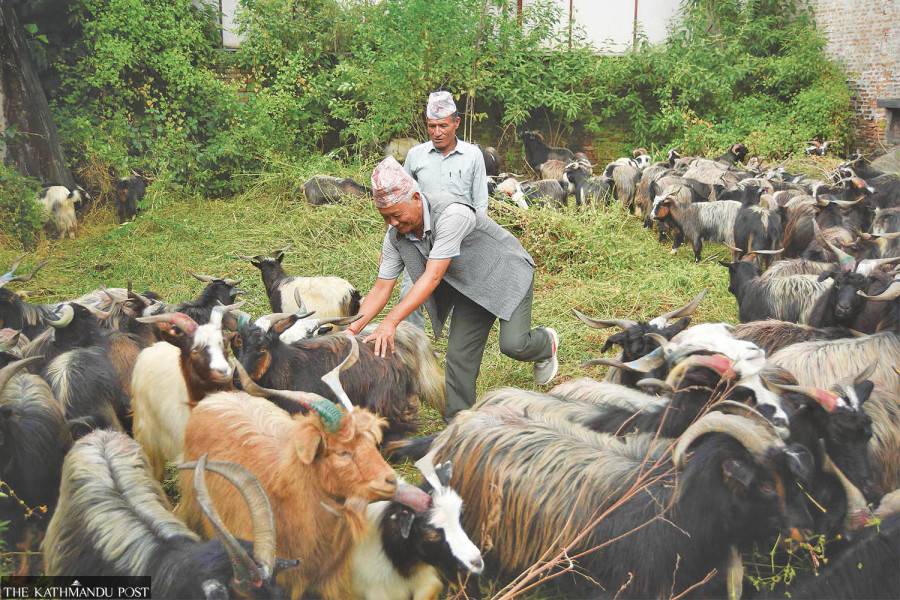Money
Goat demand up in Valley as Dashain travel is curtailed
Live goat priced from Rs630 to Rs700 per kg this Dashain. Damage to roads caused by floods and landslides has hampered vehicular movement.
Post Report
Demand for goats for Dashain meat has increased in Kathmandu after the recent floods and landslides damaged the key roads connecting the Valley. The poor shape of roads has prevented tens of thousands of people from travelling home to celebrate the festival.
Traders said that the demand for goats in the Kathmandu valley, which was 55,000 last Dashain, may swell to 80,000 this year, higher than the pre-Covid sales. Animal sacrifices and feasts mark the festival, with tens of thousands of animals and birds slaughtered during the country’s biggest festival.
“We have received around 15,000 goats as of Monday. We have targeted selling 25,000 goats this year, the same as we did last Dashain,” said Janak Kumar Khadka, president of the Kalanki Khasi Bazaar. “But it looks like demand may rise.”
Apart from Kalanki Khasi Bazaar, there are several other outlets where goats are traded, particularly for Dashain. Individual farmers in the districts surrounding Kathmandu also supply goats to the Capital.
According to the traders, most goats arrive from the western part of the country, such as Dang, Salyan, Surkhet, Bardiya, Kailali, and Dadeldhura. The shipment of goats from the eastern part of the country is smaller this year compared to last year.
Khadka said that key highways have been obstructed, and there are hassles due to long traffic jams. As a result, many people have cancelled their plans to go to their homeland to celebrate the holiday.
“We expect the demand for goats to rise sharply,” said Khadka.
Traders said the supply of goats has been normal so far, and there is no shortage. However, goats' arrival has been delayed by highway traffic.
Traders said that a long delay would be problematic. “The goats may lose weight if they’re stranded on the highway for long hours,” said Khadka.
Khadka said the number of mountain goats arriving for Dashain has doubled this year. Around 3,000 mountain goats have arrived at Sallaghari in Bhaktapur, and Kalanki Khashi Bazaar received around 2,000 heads.
Despite the rise in demand, traders claim that prices will not rise.
This year, the price ranged from Rs630 per kg to Rs700 per kg, according to Khadka. “The price may not go higher now.”
The price of mountain goats will decrease this year. A live mountain goat will cost Rs1,100 per kg, compared to Rs1,300 last year, Khadka said. The supply is sufficient as mountain goats arrived from Tibet. The traders bring them on foot from the Chinese side.
Tuesday is the sixth day of Dashain, but sales are lower than in previous years.
In the past, around this time of the year, it was normal for people to carry goats on bikes and in cars.
The streets used to be filled with goats. But traders say the market has changed.
Economists say consumption has slowed because people's real incomes have dwindled while urban households' finances are tightened due to growing unemployment, a decrease in real estate and stock prices, and rising fraud cases in the cooperatives sector.
The economic slowdown dampened the festival spirit last year, but traders were optimistic this year. But the disaster dashed their hopes.
While there is no official data on festival spending, economic activity in Nepal peaks during September-November.
Some economists estimate that 40 to 70 percent of market activities occur around the three key festivals of Dashain, Tihar and Chhath.
It is estimated that many people save yearly to spend during these festivals.
Business houses, banks, and government workers receive bonuses for festivals, and suppliers are keen to capitalise on the increased demand.
Last Dashain, the cash crunch forced consumers to cut back on purchases. But this year, banks have sufficient liquidity, and traders are optimistic about sales growth.
“We hope the number of consumers buying goats will increase from Fulpati, which falls on October 10, as the Dashain holiday also begins from that day,” said Khadka.
The Food Management and Trading Company also sells goats to intervene in the market price.
The management office at the Birgunj branch has purchased goats worth Rs10 million to be supplied to the Kathmandu valley.
Samir Dahal, information officer of the company office in Birgunj, said 488 goats were purchased from the Bagmati rural municipality in Makwanpur.
The company purchased live goats weighing 20–25 kg at Rs585 per kg, while goats weighing above 25 kg cost Rs605 per kg.




 10.12°C Kathmandu
10.12°C Kathmandu













